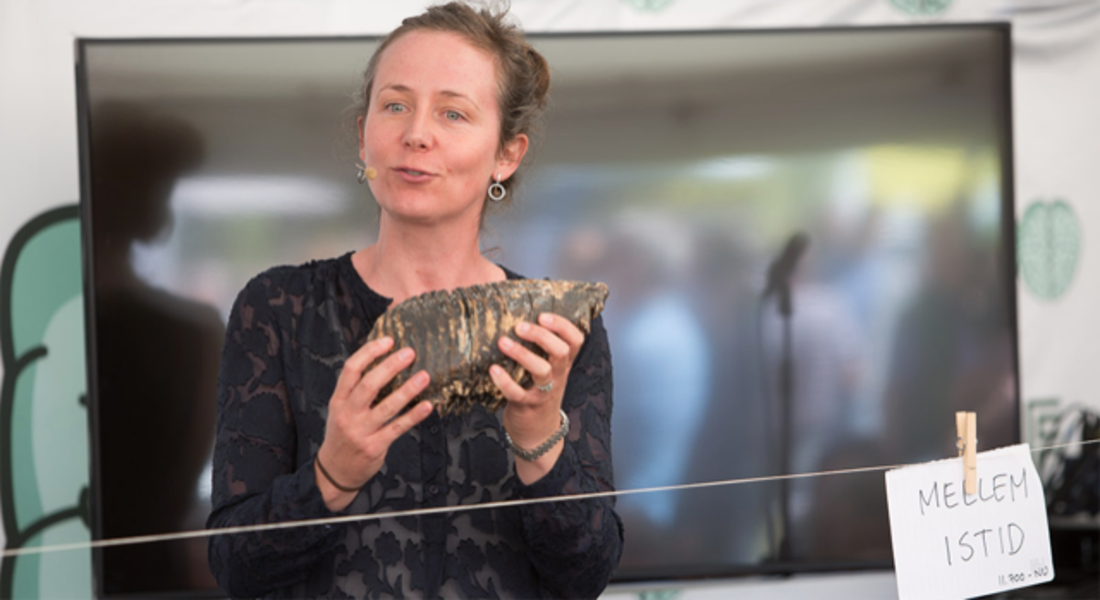Eline Lorenzen is new Deputy Head of Department for Research
Eline Lorenzen has been appointed Deputy Head of Department for Research at GLOBE Institute. Her research focuses on molecular ecology and global climate change. Eline is passionate about organisational development and creating a good workplace environment; the cross-disciplinary discussions, curiosity-driven research and energy that characterises the culture at GLOBE are some of the elements that Eline wishes to build on.

Organizational development, job satisfaction and diversity are important to Eline Lorenzen. In addition to leading her own research group, Eline was for three years the research faculty representative in the collaboration committee (LSU) while at SCIENCE, and has also worked as a freelance process consultant prior to her career in academia. Thus she brings a solid background, experience and lots of ideas to her new position, which she looks forward to implementing at GLOBE. One of her main priorities will be increasing cohesion across the institute.
I would like to bring focus to how we can use each other more across the sections and centres, to create a more cohesive GLOBE Institute, culturally as well as academically
‘We are all close colleagues and part of the same institute, but many of us primarily identify with our section or closest research unit. I would like to bring focus to how we can use each other more across the sections and centres, to create a more cohesive GLOBE Institute, culturally as well as academically’, Eline says. Researchers and staff are scattered across several locations, and this is a challenge both with regard to the feeling of cohesiveness and knowledge sharing at GLOBE. Eline explains:
‘We need to increase knowledge sharing across our institute. One key area, for example, is with regards to applying for research funding, both in practical terms but also strategically. This could take the form of sparring, or more formalised mentorship. Many of our researchers have considerable experience in the application of, and management of, large collaborative grants. Also, the transition from researcher to research leader can be challenging, in particular for younger researchers, who may not necessarily reach out to experienced colleagues for help. This is an area where sparring and mentorship are important’.
‘The best colleagues’
In addition to realising her ideas as Deputy Head of Department, Eline is very looking forward to seeing her colleagues again in person, after having been away from campus for almost three years, due to two consecutive maternity leaves and the COVID lockdowns. Working closely with collaborative and supportive colleagues, who take an interest in each other, their research and careers, has always been important to her. And in this regard, she believes that at GLOBE she has some of the ‘best colleagues’ she could hope to work with - indeed this is one of the main reasons why she decided to carry out her research at GLOBE:
‘You can be at the coffee machine and suddenly be involved in an unexpected conversation about dust from Mars, the formation of early life on Earth, or about diseases that plagued our ancestors in the past. The researchers at GLOBE are leaders within their respective fields. We all share a mutual interest in natural history in the broadest possible sense’.
Eline Lorenzen continues:
’There are a lot of great science communicators at GLOBE, who are extremely creative and keen on communicating their knowledge. It is a bit like an artists’ commune brimming with innovation and ideas; it’s very infectious and makes each one of us much more creative. It’s impossible to turn on the radio without hearing someone from GLOBE contribute to the societal debate or research policy. And I am simply extremely proud to be a part of that.’
Network at SUND
Getting acquainted with SUND is also a priority for Eline, who was not part of the transition period when GLOBE Institute was established at SUND:
‘I know SCIENCE well and have a large network there. I am not as familiar with SUND. I do, however, have a group of colleagues spanning both SUND and SCIENCE that I know from my time in the Danish Young Academy, and we meet regularly to spar with one another. Naturally, that is also something we also need to focus on at GLOBE – to also build our network across SUND’, Eline says.
Eline will continue to head her research group alongside her activities as Deputy Head of Department.
Five facts about Eline Lorenzen:
- Eline Lorenzen is Associate Professor and Deputy Head of Department for Research at GLOBE Institute.
- Her research focuses on evolution and molecular ecology of large mammals, using a combination of genomics, stable isotopes, environmental data and palaeo-archives.
- She has received research grants from VILLUM FONDEN Young Investigator Programme, Carlsberg Foundation Distinguished Associate Professor Fellowship, DFF Sapere Aude Research Leader, and most recently a YIP+ extension grant, which is awarded to the most talented VILLUM FONDEN Young Investigators
- She was a member of the Danish Young Academy 2013-2018, and has since 2018 been a member of the board of WWF Denmark
- She lives in Nærum, close to the woods, and is the mother of three children.
A fun fact: Eline had her Sapere Aude interview just two days after giving birth to her youngest child.
For further information about Eline's research outputs and activities, please visit her research profile.
